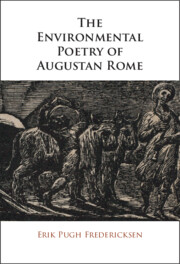Book contents
- The Environmental Poetry of Augustan Rome
- The Environmental Poetry of Augustan Rome
- Copyright page
- Contents
- Acknowledgments
- Editions of Main Texts
- Introduction
- Chapter 1 Local Dwelling and Pastoral Place in Vergil’s Eclogues
- Chapter 2 The Local Environments and More-Than-Human Music of the Eclogues
- Chapter 3 Vergil’s Ecological Poem
- Chapter 4 Poetry of Place and Planet
- Chapter 5 Natures and the Nonhuman in Horace’s Odes
- Chapter 6 Translocal Lyric
- Epilogue
- References
- Index Locorum
- General Index
Introduction
Published online by Cambridge University Press: 12 December 2024
- The Environmental Poetry of Augustan Rome
- The Environmental Poetry of Augustan Rome
- Copyright page
- Contents
- Acknowledgments
- Editions of Main Texts
- Introduction
- Chapter 1 Local Dwelling and Pastoral Place in Vergil’s Eclogues
- Chapter 2 The Local Environments and More-Than-Human Music of the Eclogues
- Chapter 3 Vergil’s Ecological Poem
- Chapter 4 Poetry of Place and Planet
- Chapter 5 Natures and the Nonhuman in Horace’s Odes
- Chapter 6 Translocal Lyric
- Epilogue
- References
- Index Locorum
- General Index
Summary
The introduction calls for a mutually enriching dialogue between ancient texts and environmental literary criticism, contextualizing the book in relation to ecocriticism and classical scholarship. It also establishes the key terms of the book’s approach – place, environment, and ecology – and distinguishes these from the unreflective use of the concept of nature. Finally, the introduction sketches the contextual background for Vergil’s and Horace’s environmental interests, noting a range of ancient traditions and discourses that took the nonhuman world seriously as a site of interest and inquiry. These include literary forebears like Sappho, Hesiod, Theocritus, and Lucretius; cultural traditions such as the Roman fascination with land surveying and agricultural treatises; political contexts like the expansion and consolidation of a quasi-global Roman empire; philosophical traditions from the Presocratics to Stoicism and Epicureanism; and religious traditions. Reading Horace and Vergil as environmental poets does not mean projecting modern sensibilities onto ancient texts but rather seeing how these authors pursue their own, different interests in place, ecology, and the environment.
- Type
- Chapter
- Information
- The Environmental Poetry of Augustan Rome , pp. 1 - 19Publisher: Cambridge University PressPrint publication year: 2024

